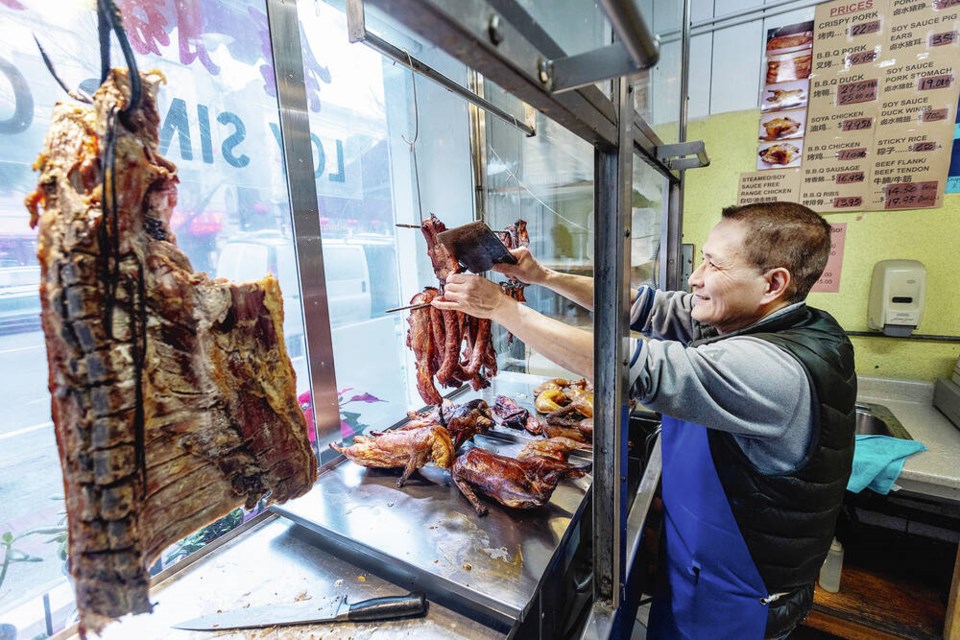When the owners of North America’s oldest continuously operated Chinese business decided to put it on the market, they wanted to keep the information low-key until the deal was made.
But when a “For Sale” sign appeared in the window next to the slabs of barbecue pork, news began to spread.
Shelly Rong and Daniel Zheng, the fourth-generation owners of Loy Sing, the storied meat shop on Fisgard Street in the heart of Chinatown, have tentatively sought buyers for several years, but have now enlisted a real estate agent to help sell the business so they can retire.
Loy Sing, founded in 1889, and its decades-old recipe for char-siu — barbecued pork — are up for sale for an asking price of $75,000.
The prospect of a sale has attracted a lot of attention for the normally media-shy couple, and Rong said she often finds herself at a loss for words in English-language interviews.
But she wants to thank Loy Sing’s long-time patrons for their support over the years.
“It’s like a family, when you see your old customers. You stop and chat whenever they come by. I feel proud of the community we have,” Rong said in Cantonese.
A native of Zhuhai, China, Rong bought into the business 24 years ago from her great-uncle Lee Tse Ping, a longstanding Loy Sing employee who took on the store from the founding Sum family.
Zheng, who is originally from Guangzhou, holds shares in the business dating back nearly 30 years.
In recent years, Loy Sing has done good trade with Victoria’s growing Filipino community, who often order entire roast suckling pigs for parties and celebrations. About 70 per cent of customers are local, despite the business being located in tourist-friendly Chinatown.
While the owners won’t say if they’ve had any promising offers yet, Rong said they hope the new owner brings his or her own ideas. “Chinatown, the essence of our culture, it needs to continue.”
Daniel Low, a second-generation Chinatown advocate, said family-run businesses in Chinatown now rarely last more than a generation.
But char-siu shops like Loy Sing are more than just butcher shops, according to Low. “We as Victorian Chinese-Canadians must band together to protect the culture.”
Loy Sing’s current lease ends in March, but Zheng said that he’s negotiating with the landlord, the Chinese Consolidated Benevolent Association of Victoria, to continue on a month-to-month basis until a buyer is found.
He has no plans for his kids to take over the business where he once worked seven years in a row with no days off.
Former long-time Victoria city councillor Charlayne Thornton-Joe said that contrary to what one may think, it’s a moment of celebration when a family Chinatown business is not taken over by the next generation, pointing to her parents, former shoestore owners in Chinatown, as an example.
“Their dream was for their children to finish high school, go to university and get jobs that have pensions and medical and dental.”
Thornton-Joe, who now works as a co-ordinator at the Chinese Canadian Museum in Fan Tan Alley, said plenty of people in the community would be happy to chip in the purchasing cost if it means Loy Sing can continue catering to the older, mostly Cantonese-speaking Chinatown community.
“A lot of elders come in for [special] occasions and some of them don’t know how to speak English.”
She sees a lot of promise in Victoria’s Chinatown, which she said has some of the lowest residential and commercial vacancy rates in the city. “People love local businesses, and they love mom and pop businesses. Nothing gets more authentic than Loy Sing.”
>>> To comment on this article, write a letter to the editor: [email protected]



